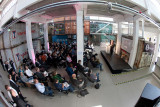Upscaling seems to be the buzz word when speaking about smart cities today. We have an overload of pilots, in the Amsterdam Metropolitan Area and in the rest of the world, and everybody is struggling how to scale up and replicate what we are doing. So let’s look a bit deeper into upscaling.
That, actually, is what Willem van Winden, lector at the Amsterdam University of Applied Sciences, Amsterdam Smart City’s research partner, did.With his team he studied various projects in Amsterdam Smart City, you can download his paper here. I will get back to his conclusions about how to scale up effectively, but first, I follow his vision that ‘upscaling’ itself is a quite fuzzy concept. What do we mean when we say we need to scale up a successful project? More participants? A twice as large geographical area? Do we want to do the same thing in another city? Who’s going to do it?
3 types of upscaling
Van Winden defines 3 types of upscaling, each with its own particularities: roll-out, expansion and replication.
Roll-out could be a further expansion of a solution tested in a pilot – in an organisation, in a city or in the market. This is often the case with solutions by one organisation with a sound business model, after a succesful pilot. The context has a low importance.
Expansion could mean expansion to a larger geographical area, to more functionalities or to more partners. This type of upscaling applies typically to platform solutions, where the value of the solution grows with the number of partner organisations. This is often the case to circular economy projects, where waste of one company is used as input for another company. Or for shared data projects, where the solution becomes more interesting and useful when more parties add their data. An obstacle here could be negotiations with new partners or new geographical conditions.You can see that with expansion, the number of partners and thus the context is more important than in a simple roll-out.
Replication could mean doing the same in an other part of the same city, with the same partnership, with a new partnership or in other cities. It can be done by the original partners, or by others.In this case, the context is highly important. A typical barrier, especially for data-based solutions, is the lack of standards, open data formats and protocols. And partners willing to share their data. Even if safety and security issues are tackled.
How to scale-up successfully?
So, knowing this, what can we learn from it? Firstly, before starting a pilot, it is a good idea to know what you mean by upscaling when the pilot is a success. What do you want to do if the idea really works, and who is going to do it? Here you can already see it makes sense to record accurately what you do and which partner has what role. So the thing with a lot of EU-funded projects is that they often deliver a toolkit with tools how to implement this new technology. Or a report, describing how the project milestones were reached. What, in fact, is interesting when you want to scale-up a complex pilot, is how you overcame obstacles, the roads you decided not to take, the u-turns you made, the problems you met and solved. This is the knowledge that you need when you want to scale-up a successful pilot project.




